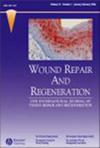Porcine‐derived collagen peptides promote re‐epithelialisation through activation of integrin signalling
IF 3.8
3区 医学
Q2 CELL BIOLOGY
引用次数: 0
Abstract
Chronic non‐healing cutaneous wounds represent a major burden to patients and healthcare providers worldwide, emphasising the continued unmet need for credible and efficacious therapeutic approaches for wound healing. We have recently shown the potential for collagen peptides to promote proliferation and migration during cutaneous wound healing. In the present study, we demonstrate that the application of porcine‐derived collagen peptides significantly increases keratinocyte and dermal fibroblast expression of integrin α2β1 and activation of an extracellular signal‐related kinase (ERK)‐focal adhesion kinase (FAK) signalling cascade during wound closure in vitro. SiRNA‐mediated knockdown of integrin β1 impaired porcine‐derived collagen peptide‐induced wound closure and activation of ERK‐FAK signalling in keratinocytes but did not impair ERK or FAK signalling in dermal fibroblasts, implying the activation of differing downstream signalling pathways. Studies in ex vivo human 3D skin equivalents subjected to punch biopsy‐induced wounding confirmed the ability of porcine‐derived collagen peptides to promote wound closure by enhancing re‐epithelialisation. Collectively, these data highlight the translational and clinical potential for porcine‐derived collagen peptides as a viable therapeutic approach to promote re‐epithelialisation of superficial cutaneous wounds.源自茯苓的胶原蛋白肽通过激活整合素信号促进再上皮化
长期不愈合的皮肤伤口是全球患者和医疗服务提供者的一大负担,这凸显了对可靠有效的伤口愈合治疗方法的需求仍未得到满足。最近,我们证明了胶原蛋白肽在皮肤伤口愈合过程中促进增殖和迁移的潜力。在本研究中,我们证明了在体外伤口闭合过程中,应用孔源性胶原蛋白肽可显著增加角质形成细胞和真皮成纤维细胞整合素α2β1的表达,并激活细胞外信号相关激酶(ERK)-病灶粘附激酶(FAK)信号级联。SiRNA 介导的整合素 β1 基因敲除损害了孔源性胶原蛋白肽诱导的伤口闭合和角质形成细胞中 ERK-FAK 信号的激活,但没有损害真皮成纤维细胞中的 ERK 或 FAK 信号,这意味着激活了不同的下游信号通路。在体内外人体三维皮肤等同物中进行的研究证实,猪源性胶原蛋白肽能通过增强再上皮化来促进伤口闭合。总之,这些数据凸显了猪源性胶原蛋白肽作为一种可行的治疗方法促进表皮伤口再上皮化的转化和临床潜力。
本文章由计算机程序翻译,如有差异,请以英文原文为准。
求助全文
约1分钟内获得全文
求助全文
来源期刊

Wound Repair and Regeneration
医学-皮肤病学
CiteScore
5.90
自引率
3.40%
发文量
71
审稿时长
6-12 weeks
期刊介绍:
Wound Repair and Regeneration provides extensive international coverage of cellular and molecular biology, connective tissue, and biological mediator studies in the field of tissue repair and regeneration and serves a diverse audience of surgeons, plastic surgeons, dermatologists, biochemists, cell biologists, and others.
Wound Repair and Regeneration is the official journal of The Wound Healing Society, The European Tissue Repair Society, The Japanese Society for Wound Healing, and The Australian Wound Management Association.
 求助内容:
求助内容: 应助结果提醒方式:
应助结果提醒方式:


